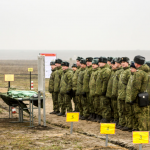RUSSIA MONITOR
Date: 29 November 2017
Russia’s Regions Rise Up
Theoretically, Russia is a federal country. After taking over the government, Vladimir Putin has repressed the aspirations of republics for their greater autonomy and took over the actual control over the election of governors and presidents of Russian subjects. However, the economic crisis has become only a catalyst for tensions between Moscow and the regions affected by budget cuts. Moreover, linguistic discrepancies can be distinguished, especially in the case of so-called “ethnic republics”. On one hand, it can be noticed that the Kremlin seeks to restrict the powers of the regions, but, on the other hand, the latter tend to resist and demand for respecting constitutional arrangements. The conflict may have serious side effects for Putin, which basically means that they might affect his result in the presidential election scheduled for March 2018.

In July, during his visit to the Republic of El Mari, Putin said that it would be unacceptable to force anyone to learn a language which was not his or her mother tongue. In addition, the president criticised the idea of cutting the hours of Russian language in Russia’s ethnic republics where non-Russian population constitutes a significant percentage. In August this year, Putin instructed the prosecutor general’s office to check whether pupils in so-called ethnic republics were forced to learn local languages. The central battlefield in the matter of what can be done and by whom has become the Republic of Tatarstan. It has greater autonomy than other subjects of the Federation, which seems to be particularly visible on the level of international relations. Another troublesome issue in the relations between Moscow and Kazan is the question of a treaty of power signed in 2007 that expired in August this year. Moscow has ignored the Tatars’ appeal to extend the validity of the document.
The population of Tatarstan is estimated at about 4 million people. Among them, there are 53% of ethnic Tatars speaking a Turkic language, 43% of Russians and 5% of Chuvash people. According to the republic’s constitution, both Russian and Tatar languages are the official ones, which is possible due to the federal constitution, and thus have the same status in school education. The local Tatar elite strives for the greatest presence of the Tatar language in education, which is negatively perceived by local Russian community. However, the courts are more favourable to the local authorities. In early November, a court in Kazan dismissed a lawsuit filed by a woman who demanded 2.75 million rubles ($47,000) in compensation for the fact that her son had to learn the Tatar language at school. In turn, the siloviki are fulfilling Moscow’s orders. The prosecutor’s office immediately began to implement Putin’s commands and demanded to consider the Tatar language as an elective subject and not a compulsory one. At that time, President Rustam Minnikhanov spoke in defense of the school directors threatened by the prosecutor’s office. He overtly warned that such a pressure on the heads of electoral offices might negatively influence the course and the outcome of the March 2018 presidential election. So he indirectly threatened the Kremlin that if it continues to pursue such a policy against Kazan, Putin’s result in Tatarstan may not be satisfactory. The case of Tatarstan may constitute a disturbing signal for the Kremlin. It needs to be taken into account that governors and leaders of republics are responsible for the highest turnout possible as well as for the best results of the Kremlin’s candidates. And in this case, it will be Putin himself. Growing tensions between Moscow and its regions, especially the economic ones, may be detrimental to the result of the current president, mostly in the so-called ethnic republics.
Eventually, both sides agreed on a compromise, which was actually more like a ceasefire. The authorities of Tatarstan will be entitled to require only two hours of the Tatar language a week, which is quite a satisfying result, since Putin wanted non-Russian languages to be completely voluntary. However, this is only Moscow’s tactical retreat whose aim is to cool down public mood before the upcoming election. They can response in an offensive way and impose russification. Moscow’s policy towards Tatarstan will probably be repeated against other ethnic republics. But if the Russian authorities manage to “calm down” Tatarstan, the largest ethnic republic, they will do the same with other entities.
All texts published by the Warsaw Institute Foundation may be disseminated on the condition that their origin is credited. Images may not be used without permission.













